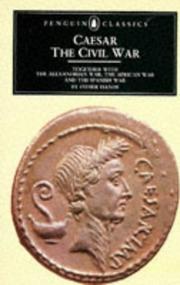How Long to Read Commentaries on
By Julius Caesar
How Long Does it Take to Read Commentaries on?
It takes the average reader to read Commentaries on by Julius Caesar
Assuming a reading speed of 250 words per minute. Learn more
Description
Commentarii de Bello Gallico (English: Commentaries on the Gallic War), also simply Bellum Gallicum (English: Gallic War), is Julius Caesar's firsthand account of the Gallic Wars, written as a third-person narrative. In it Caesar describes the battles and intrigues that took place in the nine years he spent fighting local armies in Gaul that opposed Roman domination. The "Gaul" that Caesar refers to is sometimes all of Gaul except for the Roman province of Gallia Narbonensis (modern-day Provence), encompassing the rest of modern France, Belgium and some of Switzerland. On other occasions, he refers only to that territory inhabited by the Celtic peoples known to the Romans as Gauls, from the English Channel to Lugdunum (Lyon). The work has been a mainstay in Latin instruction because of its simple, direct prose. It begins with the frequently quoted phrase "Gallia est omnis divisa in partes tres", meaning "All of Gaul is divided into three parts". The full work is split into eight sections, Book 1 to Book 8, each varying in size from approximately 5,000 to 15,000 words. Book 8 was written by Aulus Hirtius, after Caesar's death. The Latin title, literally Commentaries on the Gallic War, is often retained in English translations of the book, and the title is also translated to About the Gallic War, Of the Gallic War, On the Gallic War, The Conquest of Gaul, and The Gallic War. The victories in Gaul won by Caesar had increased the alarm and hostility of his enemies at Rome, and his aristocratic enemies, the boni, were spreading rumors about his intentions once he returned from Gaul. The boni intended to prosecute Caesar for abuse of his authority upon his return, when he would lay down his imperium. Such prosecution would not only see Caesar stripped of his wealth and citizenship, but also negate all of the laws he enacted during his term as Consul and his dispositions as pro-consul of Gaul. To defend himself against these threats, Caesar knew he needed the support of the plebeians, particularly the Tribunes of the Plebs, on whom he chiefly relied for help in carrying out his agenda. The Commentaries were an effort by Caesar to directly communicate with the plebeians - thereby circumventing the usual channels of communication that passed through the Senate - to propagandize his activities as efforts to increase the glory and influence of Rome. By winning the support of the people, Caesar sought to make himself unassailable from the boni. . It is often lauded for its polished, clear Latin. This book is traditionally the first authentic text assigned to students of Latin, as Xenophon's Anabasis is for students of Ancient Greek; they are both autobiographical tales of military adventure told in the third person, though a translation in 1985 by Peter and Anne Wiseman has Caesar speaking in the first person, which makes for a clearer read. The style is simple and elegant, essential and not rhetorical. It contains many details and employs many stylistic devices to promote Caesar's political interests. Also, the books are valuable for the many geographical and historical claims that can be retrieved from the work. Notable chapters describe Gaulish custom (VI, 13), their religion (VI, 17), a comparison between Gauls and Germanic peoples (VI, 24) and other curious notes such as the lack of Germanic interest in agriculture (VI, 22).
How long is Commentaries on?
Commentaries on by Julius Caesar is 0 pages long, and a total of 0 words.
This makes it 0% the length of the average book. It also has 0% more words than the average book.
How Long Does it Take to Read Commentaries on Aloud?
The average oral reading speed is 183 words per minute. This means it takes to read Commentaries on aloud.
What Reading Level is Commentaries on?
Commentaries on is suitable for students ages 2 and up.
Note that there may be other factors that effect this rating besides length that are not factored in on this page. This may include things like complex language or sensitive topics not suitable for students of certain ages.
When deciding what to show young students always use your best judgement and consult a professional.
Where Can I Buy Commentaries on?
Commentaries on by Julius Caesar is sold by several retailers and bookshops. However, Read Time works with Amazon to provide an easier way to purchase books.
To buy Commentaries on by Julius Caesar on Amazon click the button below.
Buy Commentaries on on Amazon
